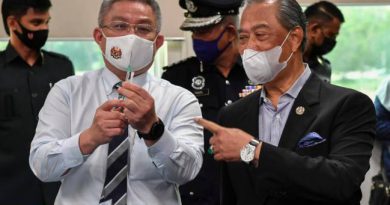‘New strategy needed for registration’
While Malaysians are scrambling to secure a slot for the AstraZeneca vaccine, tens of thousands of people have failed to turn up for their jabs under the second phase of the National Covid-19 Immunisation Programme (NIP).
The current development had prompted health experts to make a fresh call for the government to re-strategise the NIP to enable more people who want to be vaccinated to receive their jabs faster, and avoid the issue of vaccine wastage.
More than 30,000 people had reportedly skipped their vaccination appointments in Kedah, Perak and Kelantan since last month.
Meanwhile, all slots for the second round of the AstraZeneca vaccine voluntary opt-in programme, which opened at 12.15pm yesterday, were snapped up within 90 minutes, leaving scores of people frustrated and fuming.
As of Tuesday, Malaysia had also recorded a boost in the number of registrants for Covid-19 vaccines, with more than 11 million people, or 45.6 per cent of the target population, under the NIP.
The tens and thousands of missed vaccine appointments could have been efficiently diverted to crisis areas, and used to inoculate high-risk individuals as well as those who want to be vaccinated faster, experts said.
Epidemiologist Professor Datuk Dr Awang Bulgiba Awang Mahmud said the current development was an indication for the government to start re-strategising the NIP and opt-in programme to ensure that the country was on track to achieving its herd immunity goal.
“The government really needs to re-strategise the vaccination programme. It needs to push for faster delivery of vaccines from the manufacturers.
“I would strongly suggest offering the AstraZeneca vaccine to those in the high-risk group as an option in MySejahtera. This should be done as aggressively as possible,” he told the New Straits Times.
He said states in dire need of vaccination due to the high incidence rates, such as Selangor, required a more aggressive way of reaching out and vaccinating people, which could be done by permitting walk-ins for instance.
“In high incidence states, if registration and vaccination rates are slow, I would advocate going to community centres, registering people on the spot and vaccinating them on the spot for those who are fit and willing to do so.
“Some of these vaccines do not require ultra-cold storage, so this is quite possible,” said the Science, Technology and Innovation Ministry’s Covid-19 Epidemiological Analysis and Strategies Task Force chairman.
Dr Awang Bulgiba noted that there could be various reasons for registrants not turning up for their appointments, like not feeling well, being a person under investigation, being unable to travel or as a result of the negative publicity surrounding the AstraZeneca vaccine.
“The only way to establish this is by cross-checking with the PUI database and by asking those no-shows themselves. This can be done via the MySejahtera app, or by calling them up or sending them a text message or an email.”
Dr G. Jayakumar, professor of community and occupational medicine at Manipal University College Malaysia, said the authorities should relook the mechanism of registration.
Dedicated state Health Departments, he said, should be allowed to run their own vaccine registration portals under the purview of the federal authority.
Jayakumar said other avenues could also be utilised, such as post offices, places of worship, schools, malls and community centres to complement the online registration process.
He said prioritising the vaccination recipients was the way to go, especially for high-risk people, which included those above age 60, those in old folks homes, prisons, detention centres, frontline media personnel and students attached to hospitals for clinical training.
“There can be an in-built mechanism of a waiting period created, where a replacement may step in automatically once someone fails to turn up for their vaccination.”
On the mad rush to register for the AstraZeneca vaccination and the ensuing system failure yesterday, he said better planning was needed considering the high number of applicants.
“The reliability of the registration system is of utmost importance. This type of platform must be given out to reliable and reputed website developers.
“The people are in a state of pandemic fatigue, and a segment of them are in despair while awaiting vaccination.
“Issues of this nature only aggravates the distress felt by the people in the time of Movement Control Order (MCO).”
Malaysian Public Health Physicians Association president Datuk Dr Zainal Ariffin Omar said it was imperative for the Special Committee on Covid-19 Vaccine Supply Access Guarantee (JKJAV) to re-strategise the NIP.
He suggested to emulate South Korea on how unused vaccines from people who did not show up for inoculations were utilised promptly and efficiently, and made available for anyone via online reservations.
“Currently, few vaccination centres have a stand-by or substitute list to replace those who default on their appointment.”
Dr Zainal also said the re-strategising measures could also include putting the AstraZeneca vaccine back into the NIP and subsequently administered to those aged 60 and above.
And focus should be turned on those reluctant to get vaccinated, where greater awareness campaigns were needed to educate them on the importance of being inoculated.
“Millions have registered for vaccination. The high-risk group should be prioritised and if they reject the vaccine, it could then be passed down to younger individuals in need.
“We need to vaccinate as many people as fast as possible. Like Japan, we need to adopt the goal of one million shots a day. This is feasible if planned properly,” said Dr Zainal.
Source: NST




